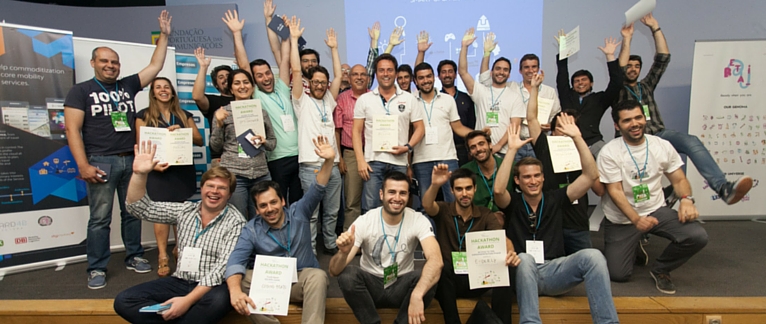
by maria | Jul 4, 2016 | Uncategorized
Last Friday and Saturday we had the Smart Open Lisboa Hackathon at Fundação das Comunicações, where in just 2 days the startups had to build a product using the open data the partners provided.
We literally felt that history was being made… this is the first open data and smart cities program in Lisbon, and the possibilities are endless.
However, even though during those 2 days we all had a blast, this hackathon had a very specific purpose. Together with all the partners involved we had to choose only 8 startups for the next phase of the program.
Tough choice, like always. But in the end these were the winners that will get to test their solutions in real life, starting in September:
eKoneksa
E-derly
Optishower
ET Concept
Load Interactive
Pedalada
Medcore
Bclose
Congratulations to all and thanks to all the others who took the challenge of improving the city of Lisbon and the lives of millions of people. See you in September!

by maria | Jun 29, 2016 | Uncategorized
This is a guest blogpost by Eurosender’s COO, Silvana Rodríguez. They pitched at Lisbon Investment Summit 2016 and now Silvana shares some of the best practices from their experience at Eurosender.
Last 7 th and 8 th of June, Eurosender had the pleasure to attend the Lisbon Investment Summit organized by Beta-i. It was not only a great opportunity to reach out and connect with investors, but also to share good practices with many interesting startups, all trying to find their way towards becoming unicorns!
As briefly mentioned in our 3-minute pitch, according to my point of view Eurosender’s success is a result of three key characteristics. I proceed to naming and explaining them with some concrete examples:
1. Being extremely capital efficient
The discussion regarding capital efficiency being a myth will not be considered in this post. I personally believe that capital efficiency does exist and that “Capital efficient startup” is not an oxymoron. Here are two situations that have helped Eurosender shift towards capital efficiency, which your startup may find useful:
a) By quickly identify blood-sucking partners and stopping cooperation right away
It’s hard to tell when a partner has stopped acting in good faith for the benefit and growth of your startup. Agencies working for a fixed monthly sum, for example, are easy to fall into the non-cooperative area and to stay in their comfort zone of doing the minimum effort and waiting for the juicy check at the end of the month. It is critical to identify this situation as soon as possible and to cut it immediately. In startups every penny is usually obtained with a lot of effort and, if used properly, 1 EUR can go a long way.
b) By identifying the successful channels and prudently sticking to them
This is not an absolute NO to innovativeness and to thinking outside of the box; but it is an absolute YES to being rational and sticking to what has proven successful. Please consider that what works for one industry doesn’t work for another: advertising through social media can be very successful for some, and can be a catastrophe for others.
2. Being bold but mindful when making decisions.
For example, hire slow, fire fast:
A great part of a startup’s success is determined by having the right amount of highly motivated people working and living for the company. Although a challenge, it is of paramount importance. This is why hiring process should be made consciously as you can’t afford to pay for someone that doesn’t truly become an asset. On the other hand, having unmotivated free-riders can really rotten the organisation from the inside, as they not only affect their own scope of work, but they influence the motivated ones into also becoming slackers. Identify them and act quickly.
3. Having a rock-solid business idea and believing in it.
Coming up with a unique business idea is, in itself, quite a challenge. If you strongly believe (and have documented yourself sufficiently to believe) that yours is truly one-of- a-kind, make sure you and all your team besides you stand strong for the idea and can defend it. Investors and competitors smell fear and insecurity.
We’re always looking forward to hear your success story, and what made your startup become what you believe it is!

by maria | Jun 21, 2016 | Uncategorized
At this point, you have probably heard about the new startup program in town, Smart Open Lisboa. It is the first smart cities and open data program in Lisbon and it promises to upgrade Lisbon’s city life. However, what most people find it hard to understand is what is open data? Why should you care? And how can you use it to create useful products that could be used by millions of people?
Well, we wrote this blogpost to clear your mind from doubts so that you and your startup can still apply to the hackathon we’ll be organising (it will be the mother of all hackathons, so brace yourselves), this July 1-2.
What is Open Data?
In theory, and according to the Open Definition, Open Data is data that can be freely used, re-used and redistributed by anyone, without any copyrights or patents. Many organisations, especially governments, collect large amounts of data every day, and this data can be used in several ways, if it’s made available.
Open Data triggers innovation and collaboration, combining data and content to solve common problems and improve people’s lives.
How can I use Open Data?
Open Data does not contain information on a specific individual but it is available more as a bulk of aggregated information. There is open data in maps, transport, science, products, education, libraries, finance, culture, or economics. All you need to know is how to use it.
For instance, imagine you had aggregated information on each neighbourhood of the city of live in: how many people live there, their age profile, number of supermarkets and convenience stores, crime statistics, price trends in housing, signal coverage, etc. All this data could be used to create a real estate platform, allowing people to make better choices when buying a house or renting an apartment for example.
Examples of Open Data
In an article on TechTarget, they give 10 examples of Open Data, according to Doug Laney, research vice president for Gartner Inc. So, if you’re looking for some inspiration or just to better understand Open Data, check out these examples from the article below:
“Embedded open content – Legal assistance site Lawyers.comhas developed an open application programming interface (API) that provides legal and other websites access to its trove of legal articles. Recipient websites can use the API to embed headlines relevant to their audiences.
Open data mashup – Students at Kansas State University put together a series of seven deadly sins maps from open data sources, depicting contemporary crimes of wrath (violent crimes) or envy (burglary, robbery, larceny and stolen cars) across the United States. “It’s a clever example of how different metrics can be mapped,” Laney said.
Entertainment and open data – Liveplasma.com is an interactive, visual search engine that gives users a chance to listen to music and see how the style of one band’s music is related to others. The data mashup uses content from YouTube.
Real-time open data – @Fbomb_co is an aggregation of people all over the world dropping “f-bombs.” Glorifying profanity? Although the example might not seem particularly useful at first blush, Laney encouraged the audience to consider the value something like this could create if the tweets were highly relevant to the company.
Syndicated open data – Data that’s packaged and sold from syndicated providers costs a little more, but, according to Laney, it’s also more reliable. Examples include Factual for data on hotels, doctors and restaurants, or Acxiom for marketing data.
Commercializing open data. Realestate.com aggregates what real estate is for sale in a specific area, but it also provides crime statistics, price trends and connections to mortgage information. Cars.com provides a similar platform for users to buy and sell vehicles.
Open data and gamification – #tweet-a-lot is a platform that enables businesses to run a tweet competition to get an event or topic trending. Anyone who posts a tweet using the designated hashtag is a player, and players play for a prize.
Banking and open data – The Open Bank Project has created an open API so third-party developers can help banks build secure, modern apps for customers quickly.
Open data catalogues – The ProgrammableWeb is one example of an open data catalogue, with more than 10,000 commercial APIs available to download, Laney said. He also pointed to government organizations, such as data.gov, which provides hundreds of open data sets to the public. In cases where open data is overwhelming, open data metacatalogues “will tell you where to go for certain kinds of data,” Laney said.”
Did we get your attention? Then, find out more about Smart Open Lisboa right here.
P.S.: Smart Open Lisboa is brought to you by these influential founding partners: Lisbon Municipality, PT, Cisco, Turismo de Portugal, Startup Lisboa and Beta-i. And this week we have just announced the support from other great sponsors, MASAI by Card4B and KIC Innoenergy.

by maria | Jun 21, 2016 | Uncategorized
I know it’s been a long time since the Lisbon Investment Summit (well, it’s just been a couple of weeks but it looks like an eternity to me) and I can’t help but look back and wonder…
I remember that right after I interviewed Eze Vidra, former General Partner at Google Ventures, for our video interviews he told me: “It’s amazing what you guys have done here. This venue, the people, it’s impressive. This is my first time in Lisbon, but I promise I’ll come back soon”.
And this wasn’t just Eze, there were many others like him… we had more than 800 attendees from every continent of the globe, over 100 investors and 150 startups. At the Investors’ Breakfast we had more than 250 one-on-one meetings between investors and entrepreneurs. On social media things were going through the roof, we had more than 1.2 million impressions on Twitter and reached over 630.000 people.
In the end, we kept our promise (just like Eze will in the near future). #LIS16 was a seriously unexpected, unusual, and informal startup event. And we would just like to thank you, from the bottom of our hearts, for being part of it.
So, if like me, you still want to go back, check out the 16 top highlights of the #LIS16:
1. João Vasconcelos, Secretary of State for Industry, telling everyone that international investors and accelerators call him everyday because they’re interested in Lisbon.

2. Lopo Champalimaud stating that the secret behind Treatwell’s 240 million acquisition was that he built the business because he believed in it, not because he wanted an exit.
3. Tradiio’s live concerts and DJ sets in the garden (great music by Surma and Vaarwell).

4. Sumon Sadhu telling Lisbon to create the ‘new normal’ instead of copying other startup scenes.
5. The Portuguese Startup Manifesto being announced.
6. Uniplaces going through their investments with their actual investors on stage.
7. The Prime-minister introducing ‘Startup Portugal’ and all the new measures the government is implementing to help Portuguese startups.

8. The venue that just blew everyone’s mind.
9. All the networking going on in the garden and terrace.

10. The Investors Breakfast with over 100 investors and 50 startups.
11. Ragnar Sass from Pipedrive giving an awesome keynote on why product matters more than anything else.
12. Eze Vidra advising startups to become cockroaches instead of unicorns, so that they survive even a nuclear disaster.
13. Caixa Capital announcing Eat Tasty from Lisbon Challenge as the winner of the Caixa Award of 75k
14. The exclusive sunset cocktail on a yacht.

15. Saul Klein, top investor and entrepreneur, explaining why he’d rather focus on surfers, not waves, when investing in startups.
16. Carlos Moedas, EU Commissioner, giving an inspiring speech where he explained that he ended up in politics because he failed as an entrepreneur.

by maria | Jun 16, 2016 | Uncategorized
I’ve been working in marketing for a few years now. But, if there’s one thing I’ve learned during this time is that things are constantly changing.
You wake up one day and Instagram changes its algorithm feed, you go to bed and suddenly realise that your email marketing campaigns aren’t converting anymore because they’re going straight to the promotions inbox. You think you know all the tricks, but you don’t.
They keep turning the goddamn tables! And your good old pal Google Analytics never lies…
You gotta be quick, learn fast and keep testing… And from my own personal experience, also learn from others who share their latest tricks and growth hacks.
So, believe me when I tell you that our next Masterclass on Growth Hacking (Monday, Jun-20) is valuable. I’ve learned immensely from Patrick Vlaskovits (the one who actually came up with the concept ‘growth hacking’) and Casey Armstrong last time they were in Lisbon for a workshop.
They’ve done awesome stuff in marketing and growth…
Patrick Vlaskovits is a New York Times bestselling author of The Lean Entrepreneur, CEO of Superpowered, and mentor at 500 Startups. He founded PaleoHacks.com, which he grew to over 2mm unique monthly visitors and a 200,000 person email list before a successful acquisition in 2014. Along with Sean Ellis and Hiten Shah, he coined the word “growth hacker”.
Casey Armstrong is founder of FullStackMarketer.com, a technology-focused marketing firm specialising in customer acquisition and revenue growth for both clients and internal projects. He has driven growth at several top technology startups, including Pivotal Tracker, Mavenlink, Loggly, and Pantheon. At Mavenlink, he helped grow the company from 5,000 to 500,000 customers, while taking them from $0 MRR to six-figure MRR.
This is your chance (and mine) to learn from them. Figure out what they’ve been doing when content marketing fails, or how to define the right channels for your business instead of starring at your analytics waiting for magic to happen.
Join us for another insightful masterclass. Get the last tickets right here.











